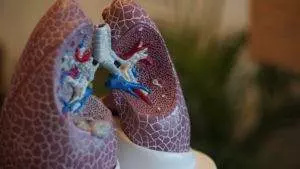By Qineng Tan, L.Ac., Ph.D. & Xiaomei Cai, L.Ac., Ph.D.

Difficulty breathing? Could it be seasonal allergies, or could I have asthma? Asthma symptoms include shortness of breath, wheezing, and an allergy cough that is usually more pronounced in the morning and evening. Acupuncture and TCM have long been recognized as offering effective treatment for allergic rhinitis (hay fever) related to asthma.
Asthma, a chronic lung condition which creates inflammation of the airways of the respiratory system, often begins causing breathing problems in childhood. In fact, asthma is the most common chronic disease affecting children worldwide. Sometimes asthma symptoms go away as a child grows up, but asthma can affect both children and adults long-term.
What is an asthma attack? An asthma attack occurs when the bronchial tubes become constricted. The tightening of muscles around the bronchi, combined with inflammation on the inner walls of these airways, causes shortness of breath, chest pain, coughing, and wheezing. Asthma attacks can be profoundly frightening; sometimes people describe the experience as feeling like they’re drowning.
Allergy triggers like dust mites and ragweed often cause asthma symptoms to flare up. Asthma attacks are often triggered by the same sorts of things that cause other types of allergic reactions: high pollen counts, pet dander, chemical perfumes, or smoke. An asthma attack can also be caused by changes in temperature, strong aerobic exercise, or a bout of intense crying or laughing. A viral respiratory infection can also trigger asthma.
Asthma attacks due to seasonal allergies are often managed by conventional medicine with inhalers, corticosteroids like methylprednisolone, or antihistamines like Zyrtecs. Usually doctors will prescribe a medication intended for long-term management of symptoms, and a “rescue inhaler” designed to stop an asthma attack in progress. Allergy medications can help relieve hay fever symptoms like itchy eyes and sneezing and help prevent a full-blown asthma attack, but they do not address the immune system imbalances that are the root cause of asthma and allergies. Acupuncture treatment used in addition to standard medical remedies for asthma has been clinically shown to help reduce symptoms and improve overall quality of life. Along with helping people maintain their normal activities and sleep better, TCM methods used in conjunction with conventional medical therapy can reduce the need for trips to the emergency room or hospital for asthma attacks.
Can asthma be cured? Asthma may never go away completely, but it can be managed so effectively that it no longer has a negative impact on your life.
Top 5 Asthma Symptoms
Asthma symptoms often begin appearing during childhood, but asthma can come on at any age. When a person develops asthma later in life, it is called “adult onset asthma.” Sometimes people don’t realize they have asthma because they aren’t experiencing what they think of as the classic “asthma attack.” A persistent cough, especially one that gets worse at night, is actually one of the most pervasive symptoms of asthma. Other symptoms of asthma include:
- Coughing frequently, allergy cough
- Wheezing (that whistling sound when you breathe)
- Shortness of breath (having trouble drawing a full breath)
- Rapid breathing
- Chest tightness, breathing chest pain
Why is asthma worse at night? The precise reason for the increase of asthma symptoms during the night, known as “nocturnal asthma,” has not been medically proven, but it is probably due to a combination of factors:
- Cooler air entering the bronchial passages
- Increase of allergens like pollen in the air
- Exposure to dust mites or pet dander in the bed
- Reclining sleep position makes it harder to breathe
- Hormone secretions that occur during sleep
Nighttime asthma can really affect your ability to get enough quality sleep.

Many of the symptoms of asthma are similar to those of an allergic reaction. However, seasonal allergies usually also cause symptoms like: head congestion, runny nose, itching inside the mouth, throat, and ears, sinus pain, and postnasal drip. Asthma doesn’t cause these sorts of upper respiratory symptoms because it is a condition of the lungs and bronchial tubes.
In order to make a definitive diagnosis of asthma, a doctor will usually perform tests that determine your lung function. A spirometer is a tool that helps determine how much air you are able to inhale and exhale. If you are able to inhale better after being given medication from an inhaler, then it will be concluded that you probably have asthma. An x-ray can show whether the bronchial tubes are blocked and determine whether there might be some other cause for lung damage, such as pneumonia or tuberculosis. Often people will also be given allergy testing to determine what triggers may affect their breathing.
Can Acupuncture Help Asthma?
Asthma has been recognized by TCM since ancient times. We call asthma “Xiao Chuan,” which means “wheezing, breathlessness.” According to TCM theory, the lungs control inhaling, while the kidneys control exhaling. Lung Qi (energy) should move downward, while Liver Qi should move upward, and these energies work in harmony. Asthma is the result of one or all of these energies entering into a state of imbalance or deficiency. Excess wind and/or phlegm get trapped in the lungs and airways, creating obstructions and producing the wheezing and shortness of breath associated with asthma. Acupuncture treatment focuses largely on strengthening the kidneys and lungs, and clearing phlegm and wind from the system.
One study determined that acupuncture treatment reduced “respiratory resistance,” helping to open up the bronchial tubes. A study in Denmark focused specifically on young children with asthma showed that symptoms and need for medications was reduced significantly after ten acupuncture treatments. A systematic review of nine studies involving patients using TCM as a complementary therapy in addition to conventional treatment showed an overall improvement in asthma symptoms and concluded that acupuncture should be considered as an adjunct to medications.

As always, herbal supplementation is also a crucial component of TCM treatment for asthma and allergies. Research has shown that classic TCM herbal formulations for asthma provide many therapeutic benefits, including: reducing hyperreactivity in the bronchial tubes, reducing inflammation of the lungs and tubes, and calming muscle contractions around the airways. One study specifically focused on children with asthma concluded that patients who were given a specific TCM herb combination showed significant improvement over a 12-week period when compared to a control group of children who received a placebo instead.
Asthma attacks are genuinely frightening, and when severe, can even be life-threatening. It is important that people with asthma have emergency inhalant medications to help them in the event of a serious asthma attack. However, the regular use of steroid medications comes with other risks. Corticosteroids can suppress normal immune function, affect the adrenal hormones, and actually increase inflammation. These unwanted side effects may be especially concerning for young children with asthma. Chinese herbs offer a safe alternative to steroids, having been used for thousands of years with no negative side effects.
Top 5 Tips to Help Control Asthma
It’s important to seek health care for managing asthma, but there are home remedies for shortness of breath and natural remedies for wheezing that may help you take control of asthma attacks and help you sleep better without an asthma coughing attack in the night.
- Don’t smoke, and avoid other people who do. Stay out of places where there is second-hand cigarette smoke or other ambient smoke or chemical perfumes.
- Use a high quality air filter in your home. Keep dust and mold under control. Remove old carpets and any other fabrics that might have dust mites in them.
- Manage stress. Stress and anxiety can be triggers for asthma attacks. Regular acupuncture treatment will help, as will consistent practice of meditation and breathing exercises.
- Avoid dairy products. Milk and other dairy foods are notorious for creating congestion and irritating the airways.
- Drink warm, soothing liquids throughout the day. Tea and warm honey-lemon water keep the airways moist and open, while providing immune-boosting properties.
Acupuncture Near Me for Asthma
The benefits of acupuncture treatment are cumulative. Building a strong and consistent partnership with a TCM provider can help you to manage asthma and allergy symptoms, boost your overall immunity, and prevent other health problems from developing. If you or someone you know has breathing problems, allergies, or food sensitivities, call Art of Wellness today to get started with a wellness regimen that will have you breathing easier.
*This article is for education from the perspective of Traditional Chinese Medicine only. The education provided by this article is not approved by FDA to diagnose, prevent, treat and cure human diseases. It should not stop you from consulting with your physician for your medical conditions. Traditional Chinese Medicine is based on Qi, which is an invisible force that usually cannot be observed by modern science. Because science focuses on testing ideas about the natural world with evidence obtained through observation, these aspects of acupuncture can’t be studied by science. Therefore acupuncture and Chinese herbs are often not supported by double-blind, randomized trials, and they are considered alternative medicine therapies in the United States.
